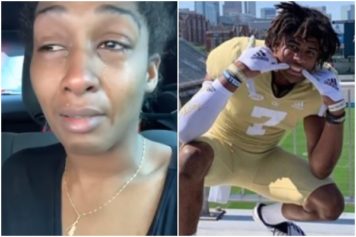
Black people are far too often misdiagnosed early on or rarely seek treatment for something they have assumed is absolutely normal.
When impacting Black patients, depression is often written off by professionals as a few really bad days, bipiolar disorder is considered a cover up for someone with a bad attitude and something like schizophrenia could just be completely ignored.
That’s the unfortunate reality of mental health in the Black community—it’s nearly impossible to get the people suffering from mental illness to step forward.
But that’s exactly what makes Lauren Carson’s work admirable.
As the executive director and founder of Black Girls Smile Inc., a nonprofit focusing on helping Black girls who suffer from mental illness, Carson has started working to clear mental illness of if its “taboo” label by first getting people more comfortable with the topic.
That was the goal of the nonprofit’s “Saving Us” Mental Wellness Brunch, which did what so few have done for Black people facing mental health challenges—make Black people feel comfortable discussing mental health.
The brunch experience allows Black people with mental illnesses to network with others who understand their plights while also helping to dispel some of the myths about such illnesses that remain too prominent in the Black community.
Perhaps the most prominent of all—Black women have to be “strong” and mental illnesses are a sign of weakness. That misconception is a part of the reason Carson decided to focus specifically on Black women.
“We put on a mask,” Carson told Atlanta Blackstar. “Black people put on a mask to the world in so many ways and it’s hard to think about taking it off. And with that, mental illness—talking about mental health—all those things are seen as a sign of weakness and we really have to break down those misconceptions.”
Carson added that too many people assume their feelings of extreme sadness or frustration are normal but that’s a dangerous assumption that could cost them their life. With suicide rates for young Black children on the rise, it’s especially vital that the Black community’s perception of mental illness is shifted in a way that will open more dialogue streams for those suffering from mental illness.
So many Black patients assume that their feelings are normal and that they will eventually go away, but it’s far too often that that isn’t the case.
“No it’s not normal for you to think about possibly killing yourself,” Carson explained. “No , it’s not normal to hear voices. Those are instances where we need to seek help.”
But getting Black people to feel comfortable talking about mental illness and actually convincing them to seek treatment are two completely different battles.
“We’re very adverse to seeking help,” she said. “It goes further back to the Tuskegee experiment.”
Unfortunately, even the medical field is one with a history of discrimination against Black people and that past is causing some to avoid seeking medical attention or being a part of clinical trials.
While the fear of such trials is a legitimate fear considering the Black community’s history of being used as America’s guinea pigs, Carson says in order to get a better understanding of mental health today they will have to put their fears aside.
It’s difficult to gear certain treatments and studies towards Black mental health patients when it seems nearly impossible to get them to participate in trials. Carson added that getting more Black therapists of color in the field could also help by encouraging patients to be more open about their plights and experiences.
Many times, patients will be more likely to discuss such things if they feel more confident that they will be understood. But even that won’t be enough to completely address the issue at hand. Carson added that even if the medical field was a more diverse one, it wouldn’t address the lack of education about mental illness.
In addition to facilitating conversations about the topic, Black Girls Smile takes things further by offering classes and more educational experiences that help patients and their loved ones garner a better understanding of mental illness and how to deal with it.


